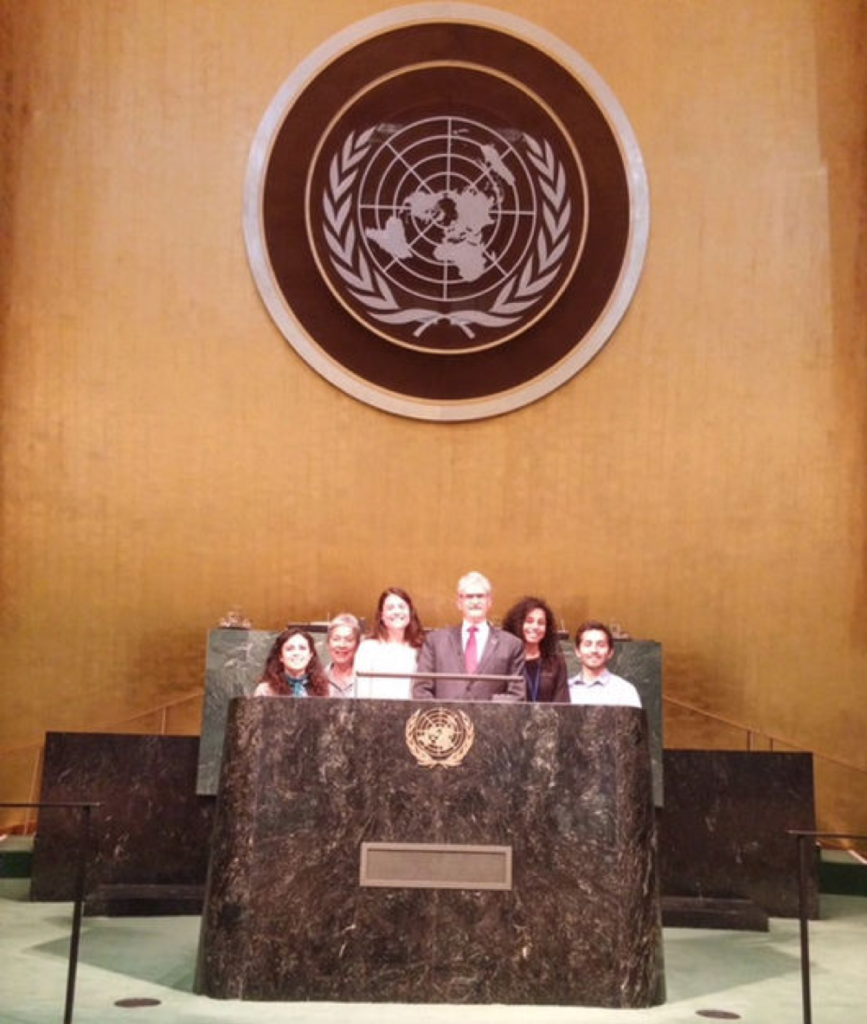June 28, 2016
🍩 This country actually has a National Doughnut Day! The event takes place the first Friday in June and was created by the Chicago chapter of The Salvation Army in 1938 to honour the Doughnut Girls, who served doughnuts to soldiers during WWI. Some 250 American Salvation Army members were in France, some of them mothering the enlisted boys and young men, serving them doughnuts, pies and coffee. I know bagels and doughnuts are quite different in everything but shape; but the other day I saw – and even tasted – a rainbow coloured bagel during the great Pride Parade here in NYC, the biggest ever with 450.000 participants and two mill onlookers lining the route.

⭐️ Once again it has been a while. Lots to tell, but so little time to actually do it! Went on a whirlwind official trip to Denmark, Qatar and Turkey in May. One summit after the other, each of them meaningful, one even ground breaking. Somehow everything fell into place on that trip! Back here at the UN new ground has been broken as well, with the selection process to SG (will return to that in later blog). Where to begin?
🇩🇰 Women Deliver in Copenhagen was ground breaking. More than 5000 delegates from 170 countries meeting, discussing, sharing experiences, getting inspiration, contemplating, charging their batteries to continue the struggle for justice, health, equality, the right to be in charge of their own lives and reproductivity. Thousands of women attended and some very enlightened men, sharing the knowledge and firm conviction that the world will be a better place when women are rightly empowered and enabled to deliver the massive contributions they can, want to and should definitely be encouraged to inject into our common world. Women Deliver – more than babies!
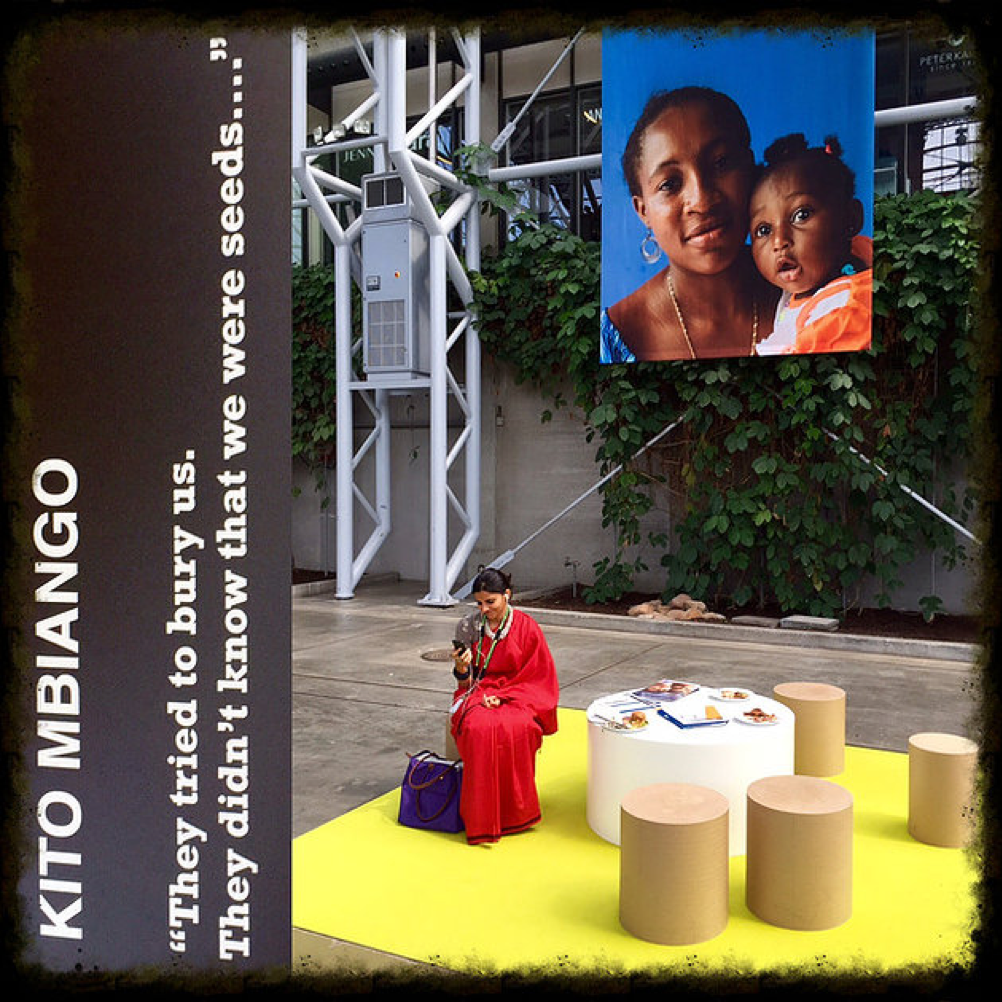
© Mette Holm
🇶🇦 Next we went to the desert state of Qatar to attend Doha Forum. Here too, meaningful dialogue, a wealth of important dignitaries from many parts, and sadly, not anywhere near as many energetic and inspiring women. We missed them in the discussions on security, stability and even prosperity in the Middle East. Doha is a very modern city, an architectural wonder rising from the barren desert. Most beautiful the Museum of Islamic Art, designed by I. M. Pei, simple and serene, floating on the sea, inspired by a simple ablution fountain.
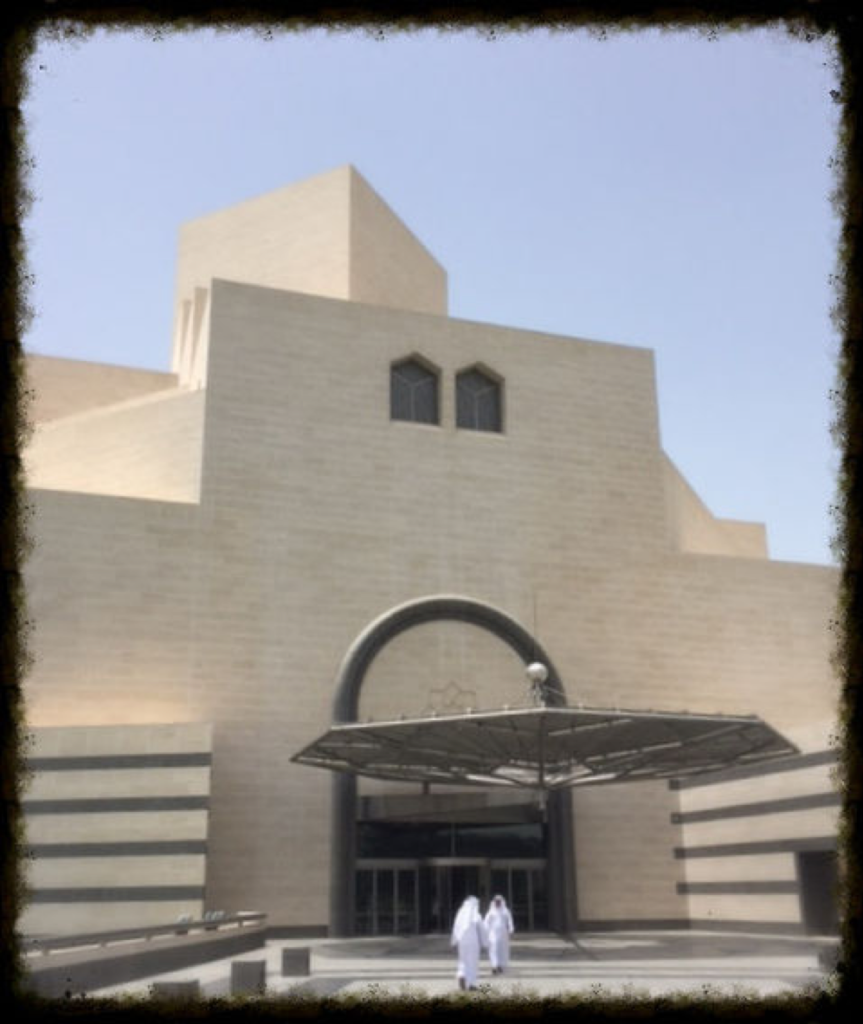
Inside carefully selected magnificent pieces described the wonders and the history of Islam from the Far East to Andalusia over 1400 years. Trade along the Silk Road in fabric, spices, ceramic, porcelain and ideas were exchanged, and the mutual inspiration was evident. Everything exhibited light as a feather and each item displayed showing off its own particular beauty.
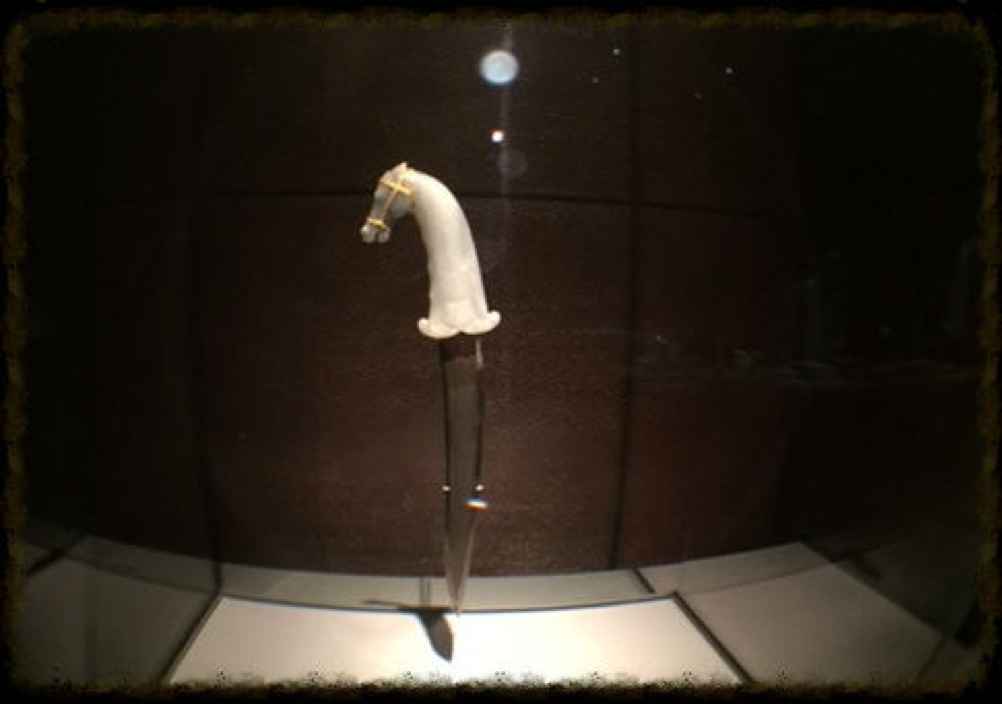
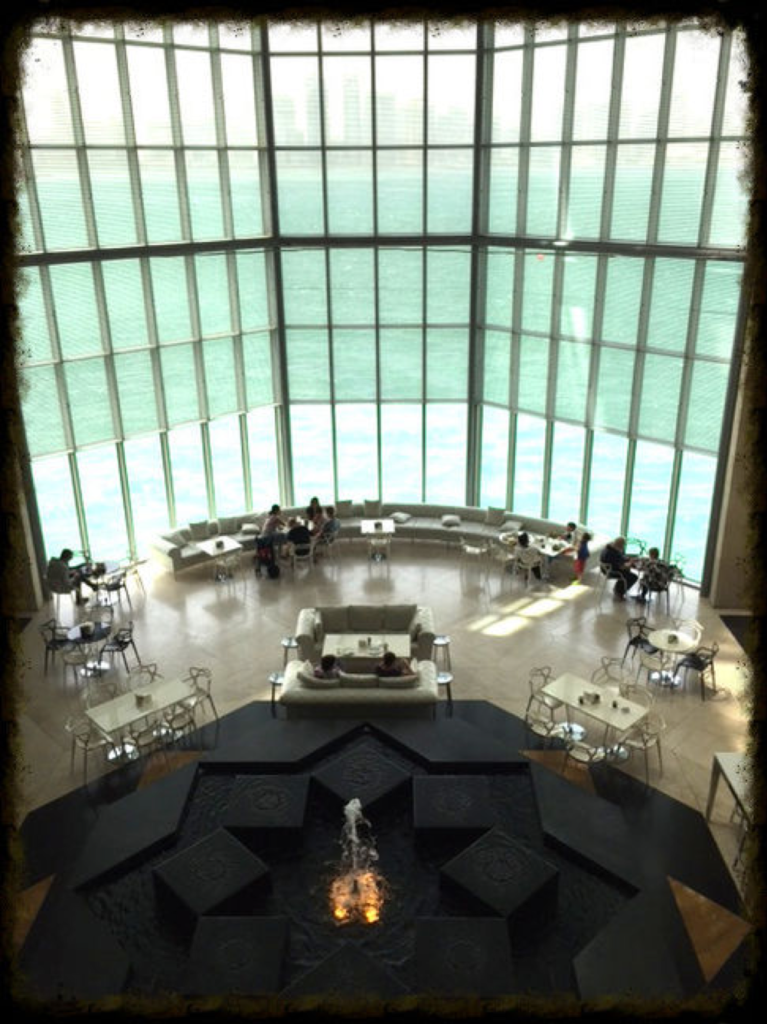
🚨 We were very well protected in Qatar with a policeman posted outside our room. When at one point I went to fetch something in the room, I found a man inside dressed in white cover-alls searching the room with something that looked like a geiger counter or a mine sweeper. Never found out what he was doing, but he greeted me nicely and hastily disappeared. We swam in The Persian Gulf and also in a hotel pool, like the other guests in Western swim wear. When I came out of the pool in my very decent bathing suit (at least by Western standard), an entire family, husband, wife covered from top to toe and two or three children turned on their heels and fled the scene. Cultural clash of sorts, I guess. Also in Qatar, we experienced a sumptuousness which isn’t sustainable. Air conditioning, enormous cars floating about, desalinated drinking water from the sea (and how would it be done any other way?), no public transport. I asked a very nice man, Ali, who was close by at all times, whether they have public transport in Qatar, and the friendly answer was, “yes ma’am, we have taxis.” And they bus their thousands of migrant workers, mainly from the subcontinent, between their camp-like quarters and construction sites. Qataris don’t seem to work a lot, while foreigners do, also in business, banking, architecture, hotels and more. And both the dirt poor workers and the wealthier and better paid experts live under heavy restrictions. Also, it is difficult to change jobs, which may cost you your work permit. Earlier this year in Doha, a young Dutch woman reported a rape by a Syrian man. She was detained for three months, prosecuted for adultery and alcohol consumption, and given a one year suspended prison sentence, before she was expelled. The perpetrator was sentenced to 140 lashes for illegal sex acts and public drunkenness. On the other hand, hotels did serve alcohol. Qatar seems unreal, a desert mirage, and something only the privileged few dare call home and might even actually enjoy.
🇹🇷 In Istanbul we attended the Humanitarian Summit, timely indeed considering the humanitarian crises raging in Syria, Yemen and more, with neighbouring countries in the Middle East and Africa courageously receiving and caring for refugees, fleeing from conflict. Had we, the Western countries, only heeded the pleas for assistance last September and earlier, many lives could have been saved, and many refugees could have been helped closer to their homes …
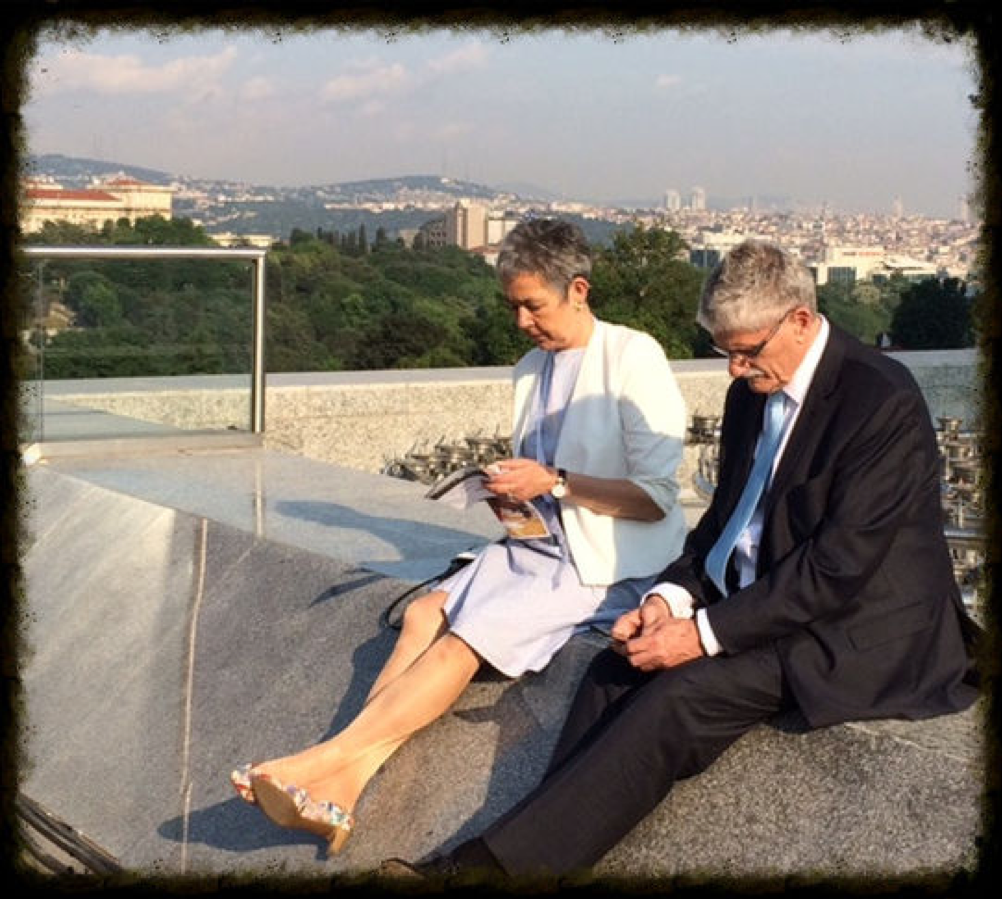
At the Humanitarian Summit I attended a side event arranged by the president’s wife on Women’s Development with particular focus on her own efforts in this field. While protocol demanded that the UN secretary general’s wife and I were seated next to Mme Erdogan, a flurry of other first ladies from different countries well nigh physically fought over seats as close to Mme Erdogan as possible. Most unbecoming, but great fun to watch. Also, even if she wasn’t the smallest speaker, Mme Erdogan was the only one to have a box to stand on at the rostrum while she spoke – there are people and people!
The most interesting side event was on how to protect journalists in conflict zones and protect their right to report independently! Sadly, not attended by other first ladies, even if it was highly appropriate, not least in Turkey where journalists are routinely arrested and harassed. Brave colleagues told of the terrifying conditions for reporting from Syria at the moment, as well as from many other dangerous areas. Some risk their lives to report, others their freedom or their professional lives. It should not be this way. Reporting should not be determined by fear, threats, bribes or mere economic interests, media monopolies, private or political!

After I posted today’s blog yet another terrible attack took place – this time at Istanbul’s Atatürk Airport. Intolerable attacks on society, and unbearable losses for the bereaved. The world must work together to combat violent extremism!
👀 I went sight seeing in Istanbul, to the Cisterns, the Blue Mosque and the Grand Bazaar – cordially escorted by a wonderful man from protocol, 6-7 policemen in three police cars and one small white car, which I suspect was carrying my blood type or something. No traffic jam could stop us as we sped along. With each step I was surrounded by 6-8 very big and very friendly police men, wearing Turkish police’s light blue ties. Never in my life have I felt so well taken care of! I must have looked incredibly important, and no one dared come anywhere near me. A gentleman in a carpet shop in the Grand Bazaar bravely invited me and my impressive escort inside to look at his goods and served all of us nice, strong tea. Even if I had assured him beforehand that I wasn’t buying, I felt bad when leaving without even the tiniest prayer mat.
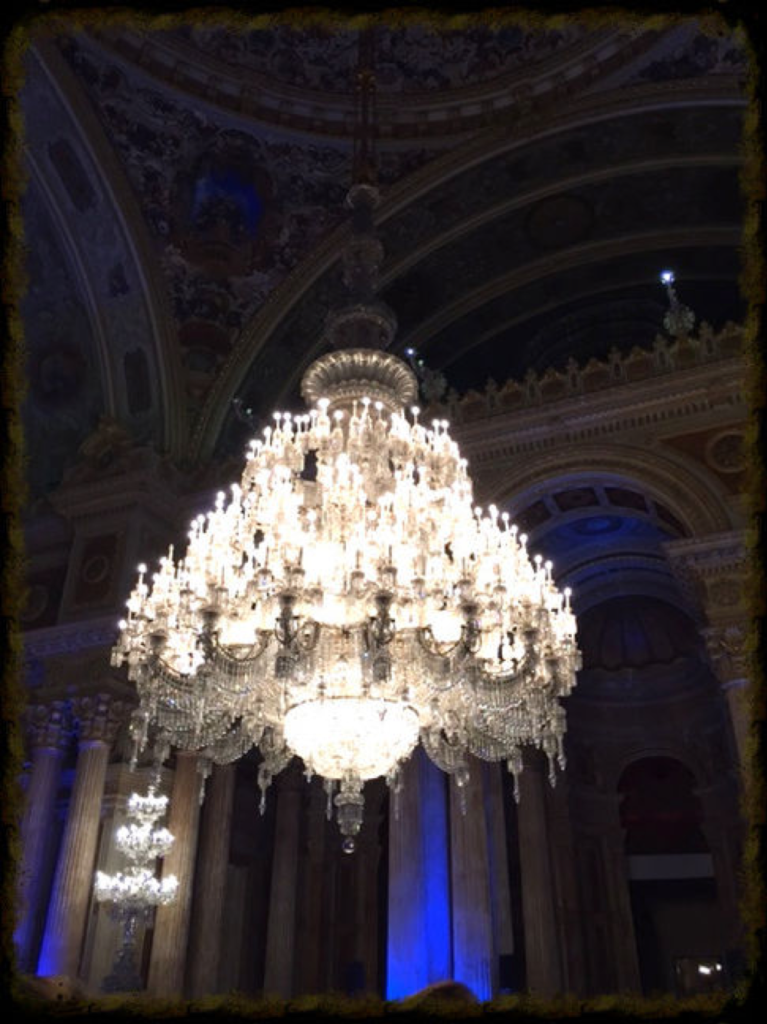
largest – and with 4.5 tons – heaviest chandelier © Mette Holm
⭐️ Our next stop was Gaziantep, in Southern Turkey, close to the border with Syria, where everything fell into place: Women Deliver, Doha Forum, Humanitarian Summit in Istanbul. It all made sense … In Gaziantep, on the banks of Euphrates, we visited a refugee camp, one of five in the province and 23 in the country. This particular camp was for families, each hosted in a three room container with a small shower, toilet and kitchen. Each person received 85 TLR per month on a credit card, so they could buy and prepare their own food. No humiliating one-size-fits-all-prison-grub scooped on a tray. I have visited many refugee camps in many countries, and have never come upon one that was more orderly, dignified, hygienic and safe. Of course, living in a refugee camp is an emergency measure, not meant for real life, but it was relieving to see one that was so clean and open with clinics, kindergarten, school and playground.
Gaziantep’s history goes back 4000 years and the city is said to be one of the world’s 20 oldest. Here too, we visited an impressive museum, testimony to a a rich and colourful history, the ancient Mesopotamia.
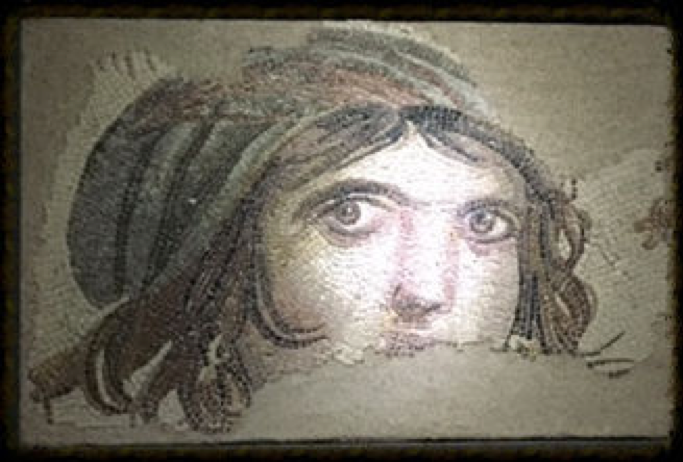
© Mette Holm
Today Gaziantep has a population of well over 1,5 mill. Add to that 600.000+ refugees from Syria, app. 235.000 living in refugee camps, the rest live and work in the city. In Gaziantep we met the brave Syrian journalists of Rozana Radio, an independent radio station that reports back to Syria as well as to Syrian refugees, exiles and others.
Gaziantep Province gets very little help from Ankara; the city and its inhabitants take care of Syrian guests that lack the means to support themselves. Residents in the camps are free to come and go, and to work if they can find a job. The city government pays the lion’s share, while citizens give whatever they cane spare. Some provided living quarters, others furniture, a job, clothes. Children attended school, and after initially teaching only in Syrian, now Turkish is also on the curriculum, in case the stay will be longer than intended. Some of the youth attended the local university. Being a refugee is surely no holiday, but the local authorities actually talked about “our Syrian guests” – indicating that their stay was temporary, but importantly also that they were welcome, which, sadly, is definitely not the case in my own country!
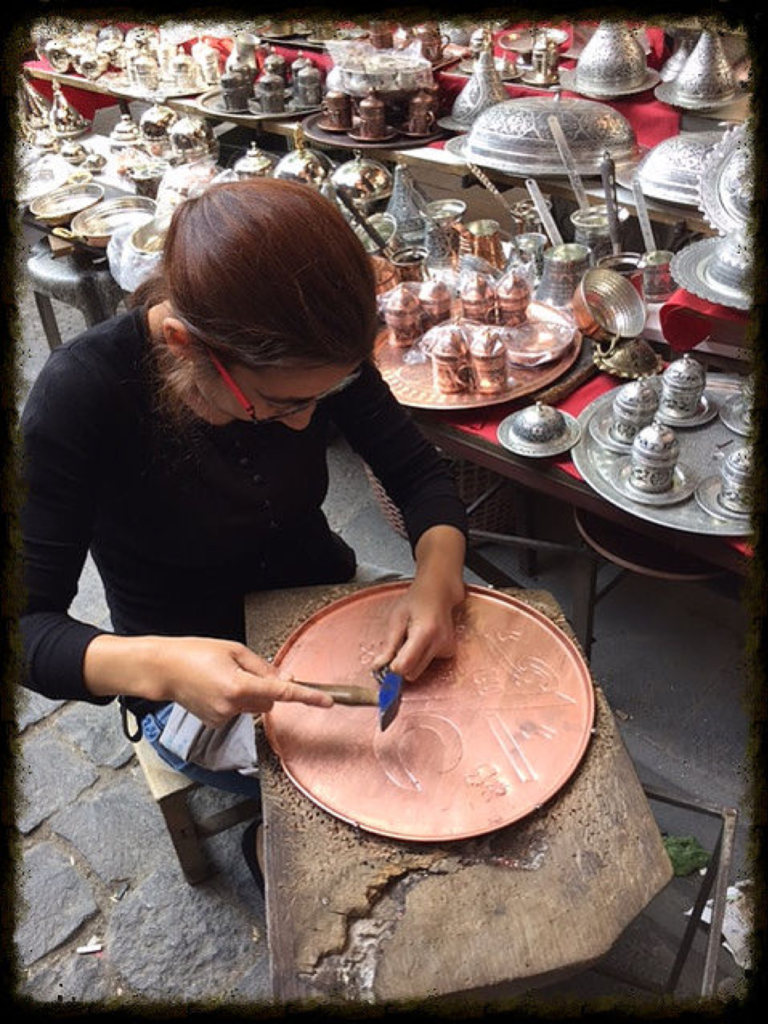
The streets of the ancient part of Gaziantep were lined with mulberry trees. I saw an old caravan serai. In the old bazaar craftsmen were hammering away on their silver, aluminum and copper, cutting wood and more. Others sold spices, coffee or wonderful nuts.
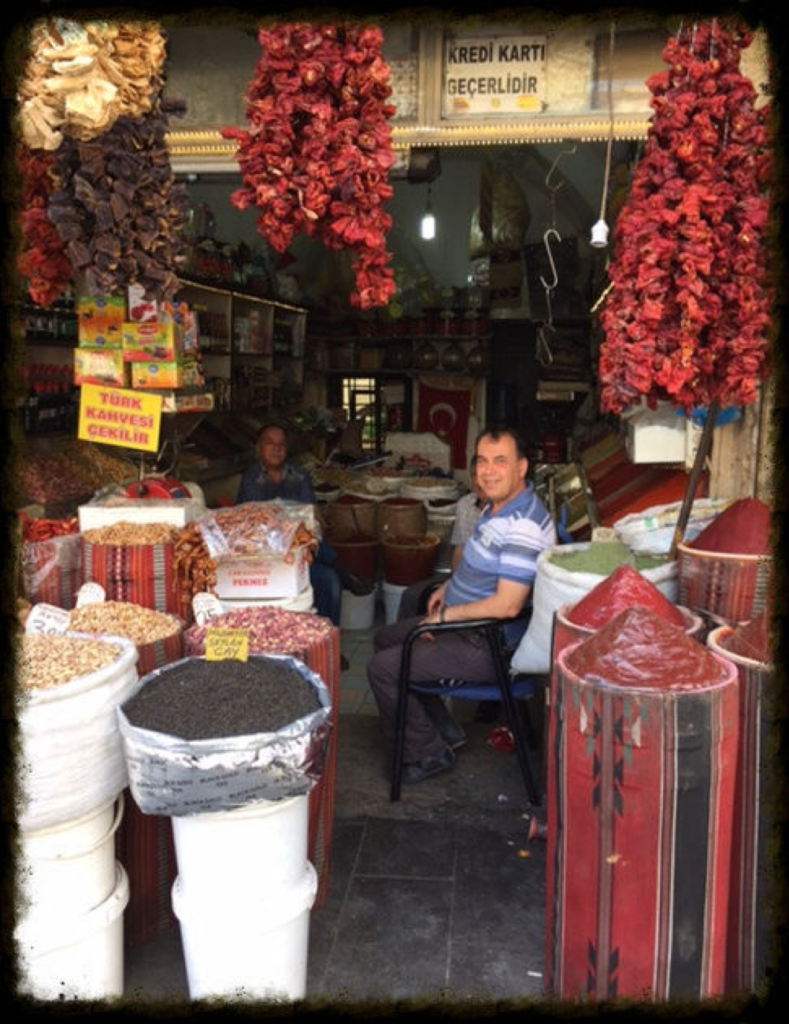
I bought the most beautiful handcrafted emerald green peaked leather shoes and a fish plate of copper and brass.
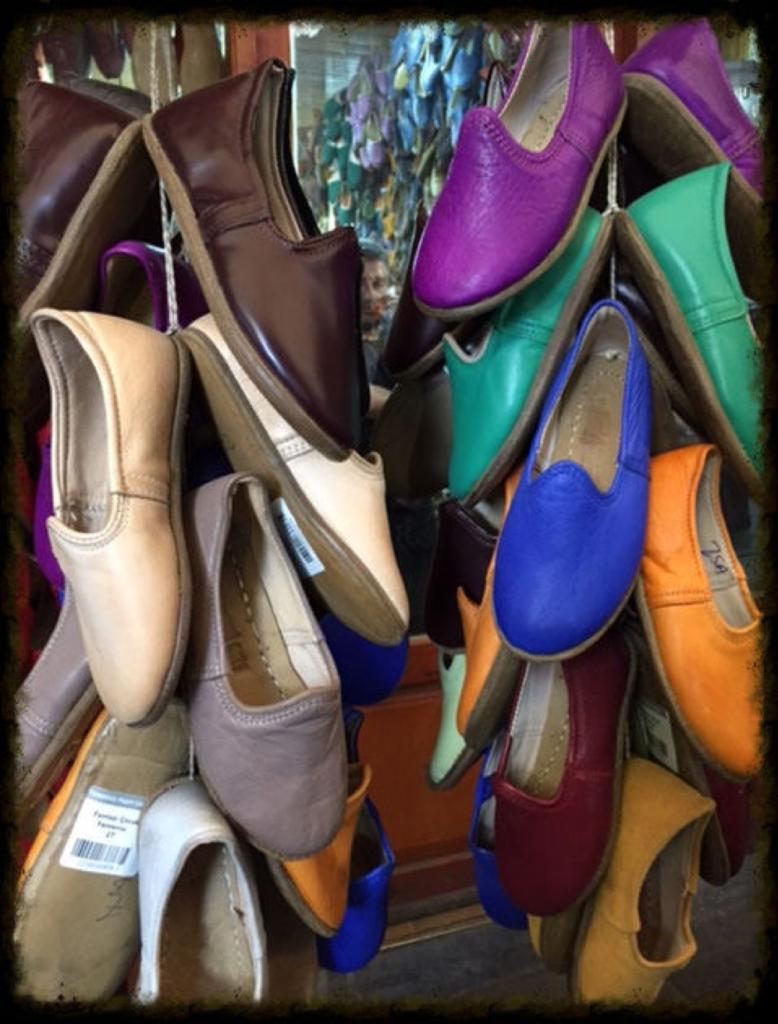
Gaziantep is a wealthy city full of entrepreneurial people. Before the civil war, border trade with Syria was a mainstay of the economy. Now, trade has been shifted to Iraq and Iran and there is construction everywhere. Also, security is sky high, and attacks are frequent, inside the city and closer to the border with Syria. Soon after we left a rocket landed in the airport, luckily no one was hurt.
🚽 The entire trip was characterised by toilets with different levels of intelligence, some had automatic fresh (I hope) plastic covering sliding across the seat for each new visitor, some flushed as soon as one got off the seat, others took some convincing, others had all kinds of extra faucets in the toilet bowl with or without tempered water. And some had entire panels with buttons for every thinkable – and unthinkable – need. And then there were the ones with only a hole in the ground with foot shaped indicators to show where to place your feet. This is something to remember on the World Toilet Day, 19. of November, the day after my birthday.
🎓 A particularly lovely event in May was the graduation of my students at Columbia University’s School of International and Public Affairs, an event that, sadly, I couldn’t attend as I was in Europe and the Middle East. As part of their master degree Alejandra from Colombia, Kristen from New York, Shabnam from California and Walter from Peru wrote a comprehensive and clever report on how National Human Rights Institutions can promote and protect the human rights of people in other countries, which don’t live up to their obligations in this respect. I so enjoyed working with the team, and also working at Columbia U, an oasis of sense in hectic NYC.
